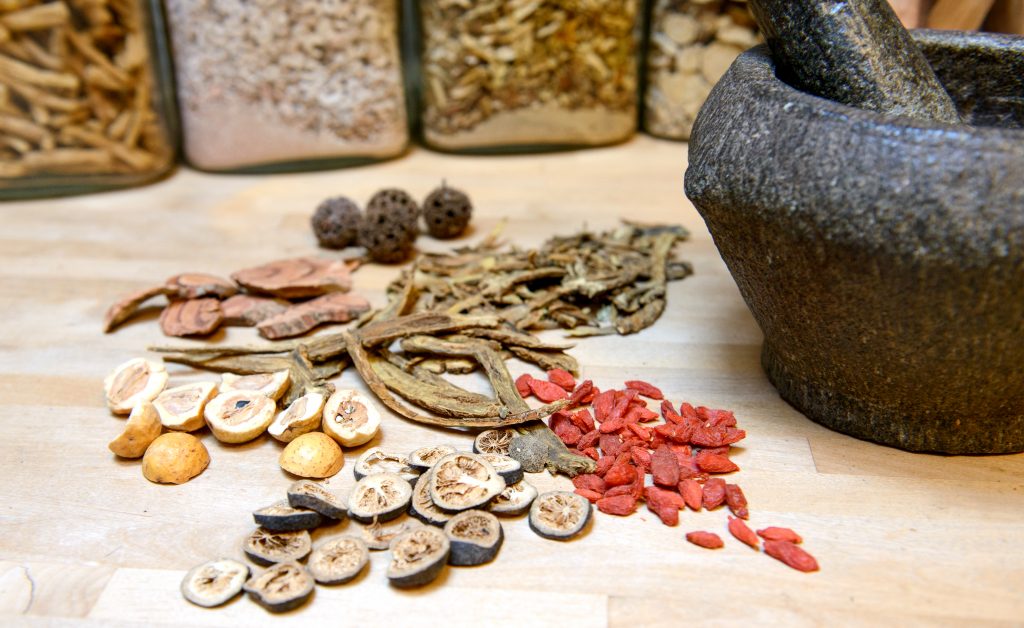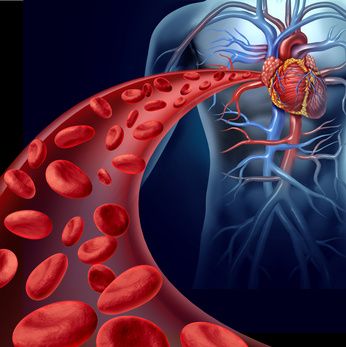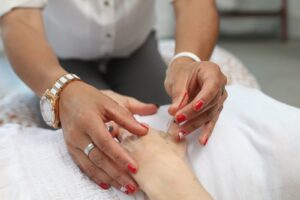Subscribe to the Newsletter
If you are interested in understanding how Traditional Chinese Medicine can improve your life sign up to my newsletter for the latest updates.

This Four Levels theory explains how to treat you when what are called ‘Warm’ diseases, such as from bacteria and viruses, penetrate your health defences. This theory is part of the theory behind Chinese medicine.
(Some pages on this site are a bit more demanding of the reader than others. This is one of them! That may be because this is where different strands in Chinese medicine come together, so to understand it you need familiarity with other parts of the system.)
What are ‘Warm’ diseases? Basically, they are caused by infectious agents such as bacteria and viruses that usually enter via your nose or mouth. But they could also enter via skin wounds and your eyes, or any other bodily orifice.
What sort of bacteria and viruses? These include:
This is easier said than done! Obviously, if you can, don’t get ill. Basically this comes down to hygiene.

The Chinese doctor who conceived the idea of the Four Levels, Ye Tian Shi, was familiar with the identification of patterns of disease according to the Six Stages. The Six Stages was, until then, the main system for classifying and treating diseases.
The problem was that the Six Stages, first set forth in 220AD, had deficiencies. It applied to diseases that were thought to be ‘caught’ by transmission through the skin, like Cold – not the common cold, caused by a virus but what happens when you get so cold you get sick.
You may not think that Cold on its own can cause a disease, but I assure you it can.
Indeed, it happened to me! I’ve put what happened to me on a page on the penetration of Wind-Cold.
As we know now, contagious diseases enter mostly via the mouth, nose and throat. But it took us – in the West – many centuries to realise this.
The Chinese were ahead of us. They couldn’t of course see the bacteria, let alone the viruses, because they lacked our modern microscopes, so they called them ‘invisible worms’.
Some of the syndromes described in the Four Levels are identical with syndromes described in the Six Stages. That shows that the body has a range of strategies for dealing with invasive diseases, and some of them are appropriate for both ‘cold’ and for ‘warm’ diseases.
Ye Tian Shi worked out the Four Levels where your body places its defences when an infectious disease (like Wind-Heat, which they called a ‘Warm’ disease) gains entry. Each of the Four Levels shows how serious a disease is and what to do about it.
These theories are used to this day in Chinese medicine. For example this Four levels theory apparently helped Chinese doctors to classify and treat the SARS epidemic a few years ago and now Covid 19.
What did YeTian Shi intend by the term ‘Warm Disease’?
Note: with hot or warm diseases you often get a skin rash. The least ‘serious’ of these are vesicles, which look like little round blisters, containing clear liquid, showing what Chinese medicine denotes as ‘Damp’ usually at the Wei level.
A bit more serious are papules which are litte bumps, red, round and solid. They denote ‘Heat’ at the Qi level.
Most serious, and usually occurring at the deeper Ying (Nutritive) or Blood levels, are macules, which look like a red stain under the skin. As such you can’t feel them by touch – the skin is flat, just ‘stained’.
Thank God for modern medicine! It saves lives all the time, especially in emergencies.
But one of its main weapons is becoming unreliable. Read how Chinese medicine explains the action of antibiotics, good and bad.

Antibiotics no longer work effectively because the bugs are getting ahead: like the weeds in my garden (and the ivy growing over the pictured phone-box) which grow faster than I can pluck them out.
Doctors are now urged to restrict antibiotic use in ‘less important’ diseases so that they can be relied on in more serious situations.
Otherwise the bugs will adapt even faster and eventually no antibiotics will work. Given that no new antibiotics have been discovered for many years, this is a problem. Indeed, some diseases are already becoming un-treatable with antibiotics. (Actually, several new ways of impeding the bugs have been found, but even if tests on humans are successful the drugs won’t become available until some time after that.)
There are other, promising lines of modern medical research and attack, but eventually the bugs will always adapt to them, so the more we can get our bodies to cope without drugs, the more likely that when we really need one of modern medicine’s weapons, it will work.
The Four Levels theory helps us to understand what is happening when, from the same bacteria or virus, one person gets one set of symptoms but his friend gets another, and what to do about it.
More even than the acupuncture points suggested at each level, the herbal prescriptions Ye Tian Shi suggested, along with enhancements to them over the following centuries, show how Chinese medicine sees a possible way through these potentially major problems.

As a warm disease penetrates, what happens? YeTian Shi recognised four main levels, with the Blood level being the deepest:
Note, the first of these, Wind-Heat. is very similar to the way your body reacts to Cold via Wind-Cold in the Tai (Greater) yang of the Six Stages. Although in both cases your body is trying to produce Heat to combat the invader, both Wind-Heat and Wind-Cold pictures have aversion to cold. This aversion to cold disappears at the next level (ie the Qi level of the 4 levels) or Bright yang (of the 6 stages).
There are five syndromes identified at this Qi level:

I have never treated anyone at the third and fourth of these four levels (the Ying and Blood levels). Or to be more accurate, I almost certainly have treated people at this level, but they were under so much medication that the symptoms weren’t apparent to me.
For example, looking back I think of a patient whom I visited in her home. She was in her late 70s.
She was taking 9 or 10 strong forms of medication AND staggering ( supported by healthcare staff) around her flat trailing a pipe with an oxygen feed.
They asked me to visit to help her respiration and cough. I cannot remember exactly what I did and doubt if many of my treatments did much good, except for one, after which to my amazement (and that of her family) she undoubtedly bucked up!
However, she later caught another cough when I was on holiday, and died soon afterwards but I rather doubt I could have helped even had I been there.
Thinking about which syndrome(s) she might have had, I incline to think that her main symptoms were of Damp Heat in Stomach and Spleen at the Qi level: also of Empty Wind agitating the Interior at the Blood level.
But, as I say, she was taking so much medication, just to stay alive, that I couldn’t see a clear pattern. I did see Phlegm and Lung deficiency and Yang deficiency which is what I treated.
I don’t work in a Western medicine hospital which is where you would end up with symptoms of the severity these Ying and Blood level syndromes describe.
In Third world countries, you could easily have these symptoms, in which case you would need urgent medical care.
The Chinese experience is that the right tools can sometimes save these four levels conditions. By ‘tools’ I mean the right herbal formulae and good acupuncture etc..
It may be that with the decline in effectiveness of antibiotics, the Chinese understanding of these conditions may provide another way for Western medicine, with its huge resources, to treat these disease syndromes.
Although Western medicine would be urgently trying to identify the appropriate antibiotic for the pathogen in question, Chinese medicine would use quite another approach to prescribe treatment. I’m sure the Chinese would not see combining the two approaches as inappropriate, or ‘cheating’!
However, remember that Western medicine can often keep patients alive, even if in a vegetative condition (such as with lung ventilators used to maintain life during the Covid epidemic). Also, modern drugs can mask many symptoms which inform a clear diagnosis of the appropriate Four Level syndrome. Indeed, sometimes you get patients who are taking so many drugs that they seem to have ‘traces’ of symptoms at several different levels.
A complicating factor is previous treatment that may have compromised the patient’s body’s expression of symptoms. Prior vaccination may have done this, as also frequent use of NSAIDs and antibiotics which impair the inflammatory processes the body would otherwise use to defend itself, thereby usually prolonging the time it takes to recover and often leading to permanent medication for chronic disease.
Such permanent medication can mask the depth and severity of the disease process.
In the Pericardium Heat syndrome of the Ying-Nutritive level, the suggested recipe is Qing Ying Tang. The action of this is not specifically to kill the pathogen (remember that 300 years ago they had no means to identify the pathogen), but to relieve the Fire, drain the heat, calm and steady the mind, and nourish Yin.
Of course, they would adapt formula to the situation. Two patients with the same Pericardium Heat syndrome might have subtly different recipes according to their needs.
One of the strengths of Chinese medicine is the importance it places not just on clearing – in this case – the Heat – but on nourishing the Yin, which the invading Heat pathogen has been damaging.
You could say that the herbs encourage the body to improve its nutrition, to get more out of what is eaten and to steady it: unlike many modern Western medications which just attack the perceived pathogen without helping the body cope with the damage it has done.

Qing Ying Tang (a herbal formula used to clear heat from the Ying level) in its original formulation required the use of rhinoceros horn. Fortunately there are nowadays better alternatives to this ingredient. This is yet another reason for condemning the needless slaughter of endangered species such as the rhino.
If this page has whetted your appetite, there are many more pages on this site to consider.

Stay in Touch!
No spam, only notifications about new articles and updates.

Book a Video consultation if you want to know more about your symptoms

This Introductory Chinese medicine course introduces you to the amazing thinking behind this ancient medicine, now increasingly in demand.

The Scottish College for Chinese medicine provides introductory courses for all, explaining Chinese medicine and its cultural background.

Master Tung’s acupuncture is a hidden treasure, lost to China but recovered in Taiwan from where it spread round the world.

Knee pain has five main causes. It’s certainly worth trying acupuncture before you resort to surgery!
Subscribe to the Newsletter
If you are interested in understanding how Traditional Chinese Medicine can improve your life sign up to my newsletter for the latest updates.
Subscribe to the Newsletter
If you are interested in understanding how Traditional Chinese Medicine can improve your life sign up to my newsletter for the latest updates.